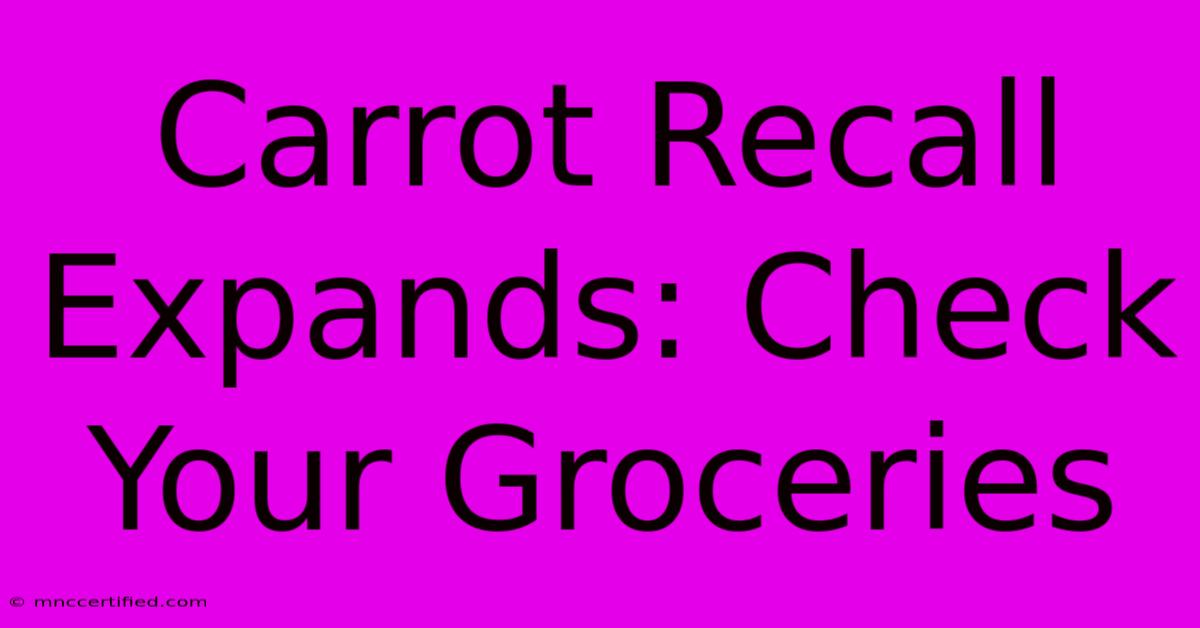Carrot Recall Expands: Check Your Groceries

Table of Contents
Carrot Recall Expands: Check Your Groceries Immediately
A major carrot recall has expanded, affecting several grocery stores across the country. Consumers are urged to check their refrigerators and immediately discard any potentially affected produce. This article provides crucial information to help you identify recalled carrots and understand the risks involved.
What Carrots Are Recalled?
The recall, initiated by [Insert Company Name Here – find the actual company name], involves [Specific type of carrots - e.g., baby carrots, whole carrots, a specific brand]. The recalled carrots are identified by [Insert specific identifying information – e.g., packaging codes, lot numbers, best-by dates]. Crucially, check the packaging carefully. Even if the carrots look fine, they may still be contaminated.
Identifying Recalled Carrots: A Step-by-Step Guide
- Locate the packaging: Find the packaging of your carrots.
- Check the lot number: The lot number will usually be printed on the package. Compare it to the list of recalled lot numbers released by [Insert Company Name Here or relevant authority]. You can usually find this list on their website or through official press releases.
- Examine the best-by date: The best-by date might also be part of the recall criteria.
- Check the brand: Ensure the brand of your carrots matches those included in the recall.
Why This Recall Is Important: Understanding the Risks
This recall is due to potential contamination with [Insert contaminant – e.g., Listeria, Salmonella]. Consumption of contaminated carrots can lead to serious illness, particularly in vulnerable populations such as pregnant women, young children, the elderly, and individuals with weakened immune systems. Symptoms can include [List symptoms – e.g., nausea, vomiting, diarrhea, fever]. If you experience any of these symptoms after consuming carrots, seek medical attention immediately.
Protecting Yourself and Your Family
- Discard recalled carrots: If your carrots match the recall details, throw them away immediately. Do not consume them, even if they appear perfectly fine.
- Clean your refrigerator: Thoroughly clean any surfaces that may have come into contact with the recalled carrots to prevent cross-contamination.
- Check your receipts: If you purchased carrots recently, review your grocery receipts to identify the brand and lot numbers.
- Monitor for updates: Keep checking for updates on the recall from official sources. The recall information may change as the investigation progresses.
Where to Find More Information
For the most up-to-date information about the expanded carrot recall, visit the official website of [Insert Company Name Here or relevant authority]. You can also contact the company's customer service department directly using the number provided on their website.
Remember, your health is paramount. Taking the necessary precautions to avoid consuming recalled carrots is crucial to preventing potential illness.
Frequently Asked Questions (FAQs)
Q: What should I do if I have already eaten the recalled carrots?
A: Monitor yourself for symptoms such as nausea, vomiting, diarrhea, or fever. If you experience any of these, seek medical attention immediately.
Q: Can I return the recalled carrots to the store?
A: Most stores will gladly accept the return of recalled products. However, check their return policy beforehand.
Q: How long will this recall last?
A: The duration of the recall will depend on the investigation and the company's response. Stay updated through official channels.
Keywords: Carrot recall, food recall, grocery recall, food safety, Listeria, Salmonella, contaminated carrots, baby carrots, whole carrots, [Brand Name], lot number, best by date, food poisoning, health alert, consumer alert, safety warning.
(Note: This is a template. Remember to replace the bracketed information with the accurate details from the official recall announcement.) This article is for informational purposes only and should not be considered medical advice. Always consult a healthcare professional for any health concerns.

Thank you for visiting our website wich cover about Carrot Recall Expands: Check Your Groceries. We hope the information provided has been useful to you. Feel free to contact us if you have any questions or need further assistance. See you next time and dont miss to bookmark.
Featured Posts
-
Gmails Dummy Email Addresses Coming Soon
Nov 19, 2024
-
Smci Stock Jumps Nasdaq Listing Secured
Nov 19, 2024
-
Daikin Field Astros Stadiums New Name
Nov 19, 2024
-
Landlord Insurance North Carolina
Nov 19, 2024
-
Certificate Of Insurance Fillable
Nov 19, 2024